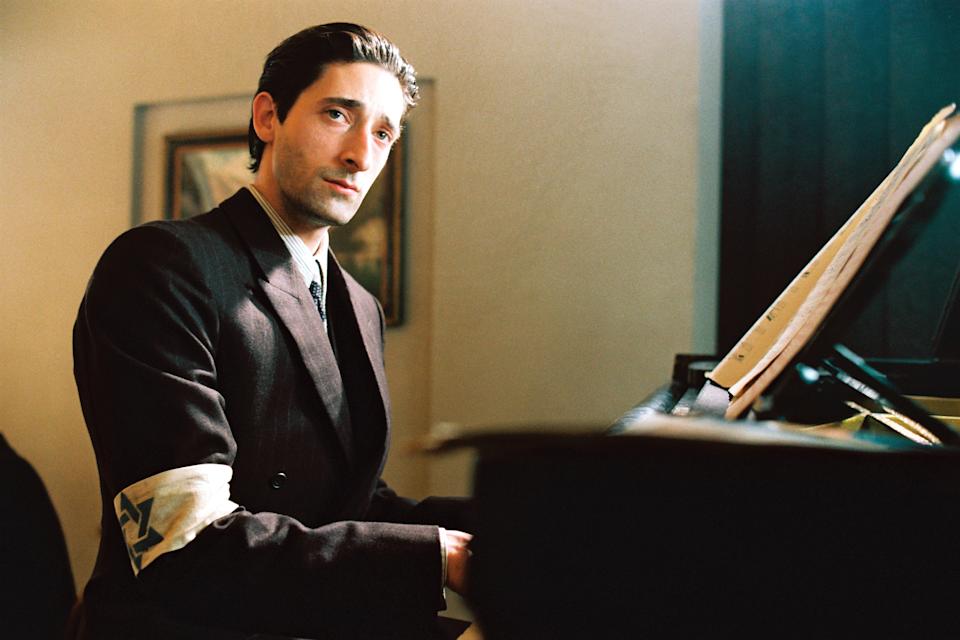There are likely few careers that epitomize the ebbs and flows of Hollywood stardom like the one Adrien Brody has had so far.
The 48-year-old Queens native took early dues-paying roles in movies like a 1991 project called The Boy Who Cried Bitch and the feel-good 1994 sports fantasy Angels in the Outfield. He worked opposite Tupac Shakur in 1996’s Bullet, impressed critics in the 1998 indie Restaurant, and soon caught the eye of top-dog auteurs like Terrence Malick (who cast Brody in a lead role in his meditative war epic The Thin Red Line before famously cutting most of his screen time) and Spike Lee (who hired the versatile actor to play the wild-haired punk rocker Richie in his sweaty serial killer thriller Summer of Sam).
His blossoming career hit a crescendo with The Pianist, Roman Polanksi’s 2002 drama about Holocaust-surviving Polish-Jewish composer Władysław Szpilman. Brody dropped 31 pounds, gave away his car, apartment and other possessions to get in touch with Szpilman’s suffering, and learned how to play Chopin for the role. He was awarded with an upset win at the Oscars in 2003, beating out Jack Nicholson, Daniel Day-Lewis, Michael Caine and Nicolas Cage to become the youngest man ever to win Best Actor at 29. (Brody, of course, celebrated by delivering a swooping kiss on Halle Berry, a moment the Academy still calls a “favorite” but hasn’t aged well with time, and which the actress doesn’t look back at very fondly.)
Predictably, Hollywood really came calling then. M. Night Shyamalan personally recruited Brody for his top-secret twister The Village (2004). Peter Jackson enlisted him for a key role in King Kong (2005). Wes Anderson welcomed him into his regular company of quirk-fest players in The Darjeeling Limited (2007). Rian Johnson cast him in his loopy Brick follow-up, The Brothers Bloom (2008).
The ‘10s, though, were hit-and-miss. Beyond 2010’s Predators, Brody strayed away from big-budget filmmaking. And beyond a Woody Allen movie (2011’s Midnight in Paris) and another Anderson collab (2014’s The Grand Budapest Hotel), his film work rarely made much noise.
A foray into television with a role in the fourth season of BBC’s Peaky Blinders in 2017 put Brody back in the public eye. Now, five years later, he’s on fire again.
Coming off a year where he costarred in his fourth Anderson ensemble, the critically acclaimed The French Dispatch, and made a memorable guest starring appearance on HBO’s enthralling hit series Succession, Brody will soon be seen in Adam McKay’s buzzy Los Angeles Lakers series Winning Time (playing coach Pat Riley) and opposite Ana de Armas in the Marilyn Monroe biopic Blonde.
This week, though, Brody stars in the gritty, slow-burn thriller Clean, a passion project the actor describes as a decade in the making that he also co-wrote (with director Paul Solet), produced and scored. He plays the eponymous lead, a down-and-out garbage collector with a tragic, violent past whose newfound protective role over a teenage girl leads to volatile clash with local mobsters.
“It’s been over 10 years that I’ve wanted to tell a version of Clean and have had this character in my head,” Brody says. “I’ve been waiting for something in some respect similar to come my way and for whatever reason it hadn’t. I feel like I’ve spent a lifetime working, and working with really incredible filmmakers… But this is an adolescent fantasy of mine to play a character like Clean.”
Watch the Clean trailer:
In our latest episode of Role Recall (watch above), Brody talks through a handful of highlights from his lifetime working. Some quotables below:
On suffering for his art while preparing for The Pianist:
“An actor’s responsibility is to do what they can to inhabit the individual that they’re playing. The more that an individual is feeling on screen, the more truth that should emanate, and there was just so much that was necessary. You can’t act being emaciated, and that was really important to the storytelling… So I had to do a starvation diet and I went down to 129 pounds for that role and then had to immediately gain it back because we shot in reverse chronology… I had to learn to play good extended portions of Chopin’s Nocturnes and Ballades for the sequences that Roman wanted to shoot, and I don’t read music… So I had to learn that through a very technical muscle memory and appending what I had learned along the way. And interestingly enough, all of those things, and the certain sacrifices I made and detaching from the rest of my things that I felt were distractions from my life really put me into that zone.”
On following up his Oscar win by playing the intellectually disabled Noah Percy in The Village:
“It was a challenging time for me. I had to make a decision at a time where [like M. Night Shyamalan], I was facing a great deal of scrutiny, obviously. To play a character that was probably far off the path of what the logical choice would be for an actor in my position at that time. And because I love his work, and my approach through the years in working with all of these interesting filmmakers that I’ve been blessed to work with, I’ve always pursued the role that spoke to me. If it spoke to me in a way, and it had a degree of risk and it had a complexity that required me to learn something and was different from something that I had already done… Those were the key symbols saying that you should proceed.”
On becoming an action star in King Kong, Peter Jackson’s follow-up to his Oscar-winning Lord of the Rings trilogy:
“What I loved about Peter Jackson’s King Kong was that this character [screenwriter Jack Driscoll], if you look at the original [1933 version], it had such a superficial depiction of that character. [He] was a ship’s first mate…. It didn’t really, in my opinion, seem like he really loved and longed for [actress and love interest Anne Darrow]. It was vastly improved and vastly more nuanced and more sensitive… And also, it was at the time Universal’s biggest movie. They had never invested that [much money] into one feature film. Peter was creating a massive studio by doing this. It was such an enormous undertaking. I’ve never seen anything like that.”
On joining the HBO hit Succession in its third season as billionaire power broker Josh Aaronson:
“I love Succession. I love the writing and obviously, these actors are thriving in these roles and it’s just great. It’s vastly entertaining, I think, and speaks to a lot of what’s wrong in the world… And you know, it was a wonderful character. The writers and the creative team were really very good to me and gave me a lot of opportunity to make something special with that.”
Clean is currently in theaters and streaming on all major platforms.
— Video produced by Anne Lilburn and edited by John Santo




